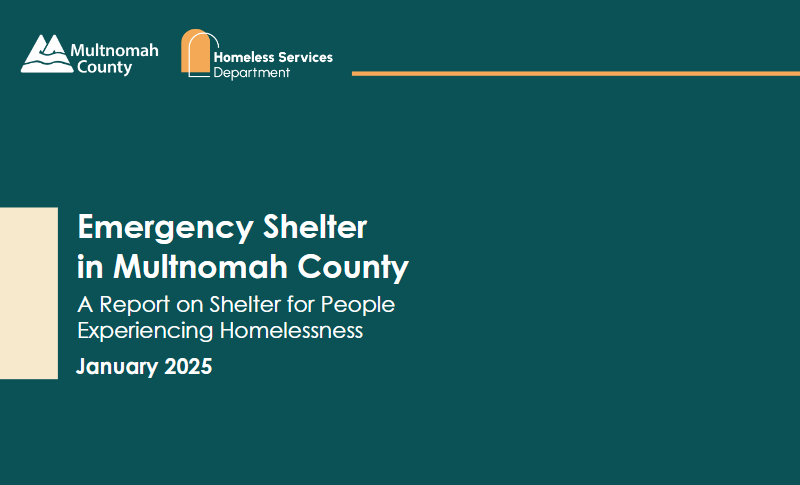The Latest from Our Office
Reports
JOHS Quarterly Reports
These System Performance Reports track statistics, demographics data and progress in key performance measures based on quarterly data. System outcomes data is generated by Homeless Management Information System (HMIS) staff in the month following the close of a quarter, and then analyzed by JOHS staff.
Supportive Housing Services (SHS) Reports
The Supportive Housing Services Measure is a coordinated effort between Metro and Multnomah, Clackamas and Washington counties to reduce chronic and overall homelessness. With voters’ approval of Measure 26-210, funding has been dedicated to improving access to services for communities of color, people with disabilities, low-income households and others most at risk of homelessness.
Previous Reports
Point-in-Time Count Reports
The federally required Point-in-Time Count provides a biennial, one-night snapshot of the number of people experiencing certain types of homelessness in Multnomah County: people living unsheltered, in shelter or in transitional housing.
Other data includes age, race/ethnicity, length of homelessness and disabling conditions. The Count ensures the JOHS remains eligible for federal funding and shapes policy and budget decisions.
Emergency Shelter in Multnomah County: A Report on Shelter for People Experiencing Homelessness
In January 2025, the Homeless Services Department published a research report on emergency sheltering best practices, which includes a summary of nationally recognized effective shelter strategies and how those strategies are operationalized in Multnomah County; current research on effective shelters, including research conducted locally; and an exploration of some common strategies being implemented in other communities.

Shelter Utilization Report
Shelter utilization reports show the number of people newly served in shelters per quarter, the number of people served in shelters per year, utilization rates, and demographic information on people served — including data on race and ethnicity.
Alternative Shelter Evaluation Report
A report published in early 2024 by Portland State University’s Homelessness Research & Action Collaborative (HRAC) indicates that alternative shelters provide better outcomes for people experiencing homelessness than traditional, congregate shelters. The research, conducted by HRAC on behalf of Multnomah County’s Joint Office of Homeless Services (JOHS), analyzed the cost, participant experiences, and client outcomes in village-style and motel shelters as compared to more traditional congregate shelters.
The study found that motel and village shelters, which provide private living spaces that support the autonomy, dignity, and safety of clients, led to better experiences and more positive outcomes than congregate shelters. This work will inform the implementation of the JOHS Community Sheltering Strategy and support the knowledge base of effective shelter models among homelessness services funders and providers.
Built for Zero Progress Reports
Built for Zero is a national movement of more than 90 cities and counties — including Portland, Gresham and Multnomah County — working to measurably and equitably end homelessness with a data-driven approach. Its goal locally is to address chronic homelessness by achieving “functional zero,” a milestone reached when chronic homelessness is rare and brief.
Previous reports



